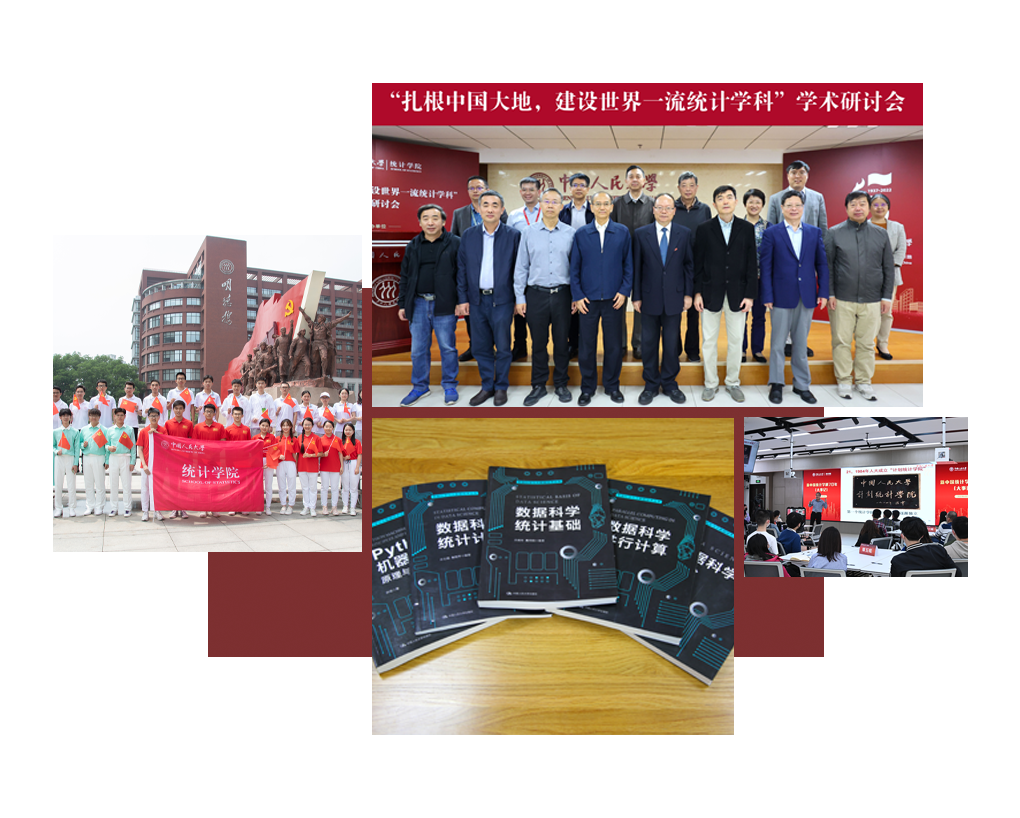School of Information
School of Statistics
School of Chemistry and Life Resources
Department of Physics
Institute of Statistics and Big Data
School of Mathematics
Gaoling School of Artificial Intelligence
School of Information
School of Statistics
School of Chemistry and Life Resources
Department of Physics
Institute of Statistics and Big Data
School of Mathematics
Gaoling School of Artificial Intelligence
School of Information
The School of Information is the first institute named after "information"
in Chinese universities. It aims to cultivate outstanding scientists and
engineers in the information science and technology area, as well as
cross-disciplinary experts who can apply modern information technology to
economics, management and other fields. After more than 40 years of
development, it has built an integrated undergraduate, graduate and doctoral
training system for multiple disciplines of information science and technology.
It is a top-notch school in computer science and technology, and the leading
school in database and big data in China.

School of Statistics
The School of Statistics is ranked the first in the
national first-level academic discipline of statistics by the Ministry of
Education. It is a top academic institute in the national strategy of
developing first-class universities and first-class disciplines globally. Our
vision is to address current and future challenges faced by China and the
global through the excellence in education and research. Our mission is to
develop leaders in statistics, data science, actuarial science, econometrics,
and biostatics.

School of Chemistry and Life Resources
The School of Chemistry and Life Resources at Renmin University of China
has undergone a recent restructuring and upgrade, building upon the foundations
of the original Department of Chemistry and Department of Environmental Science
and Engineering. Embracing the forward-thinking concept of "life
resources," the school integrates resources from diverse disciplines
including chemistry, environment, agriculture, forestry, materials, and
medicine. Its mission is to utilize scientific methods to enhance and optimize
life-supporting mechanisms, foster a faculty with strong professional
expertise, outstanding research capabilities, and the courage to lead in the modern
era. The school aims to cultivate a cohort of patriotic and explorative
individuals who will serve as national pioneers and pillars of rejuvenation.
With state-of-the-art research facilities, the school offers students a broad
academic perspective and a high-quality research environment.

Department of Physics
The Department of Physics of Renmin
University of China was established in September 2005, covering two undergraduate majors in Physics and Materials Physics, a first-level doctoral
program in Physics, three second-level doctoral programs in Theoretical Physics,
Condensed Matter Physics, and Atomic-molecular Physics, and corresponding master's programs. " In 2020, Physics was approved as a national first-class undergraduate program. One year later, the program was selected as
a base for the Ministry of Education's "2.0 Program for Cultivating Top-notch Students in Basic Disciplines". In addition, we have one Beijing key laboratory,
one key laboratory for neutron scattering in Renmin University of China, and
two "Changjiang Scholar Innovation Teams" authorized by the Ministry
of Education. So far, the Department of Physics has received one second-class
prize of the National Natural Science Award, one first-class prize of the
Natural Science Award of the Ministry of Education, one second-class prize of
Beijing Science and Technology, and one second-class prize of Zhejiang Natural
Science Award. The Department of Physics, with its mission to cultivate
top-notch innovative talents, is a rising star among the physics departments of
well-known universities in China and abroad, with its international management
model, excellent teaching conditions, outstanding research capabilities, and
active international exchanges.

Institute of Statistics and Big Data
The Institute of Statistics and Big Data (ISBD) at The Renmin University of China was established in May of 2015 with the mission to build a first-class discipline in Statistics and Data Science. It supports research and teaching in traditional statistical areas, such as mathematical statistics, financial statistics, biostatistics, computational statistics, spatial statistic and applied statistics, and other related areas, such as large data optimization and algorithm, large data (structured or non-structured) mining, machine learning and deep learning.

School of Mathematics
The School of
Mathematics is currently comprised of Institute for Mathematical Sciences,
Engineering Research Center of Financial Computing and Digital Engineering
Department of Pure Mathematics and Applied Mathematics, Department of
Information and Computational Science, Department of financial mathematics and
financial computing. In 2011 it was approved to grant doctoral degrees of the
level-1 discipline on mathematics. In 2019, the post doctoral research station
of mathematics was approved, and mathematics and applied mathematics entered
the first batch of first-class undergraduate majors in China. The school
currently has 61 full-time teachers, among whom there are 3 foreign professors
(full time) and 10 teachers are elected to the National Talents Plan.

Gaoling School of Artificial Intelligence
Gaoling School of Artificial Intelligence
(GSAI) is an official school affiliated to Renmin University of China (RUC).
The vision of GSAI is to become a top school that will influence and shape the era of AI. The goal of GSAI is to innovate a world-class academic system, to build a
world-class faculty team, to cultivate world-class students, and to produce world-class research results. Along with advancing AI theory and technology, GSAI is committed to bringing AI and humanities together and exploring the “intelligent
and warm” future for the world.






